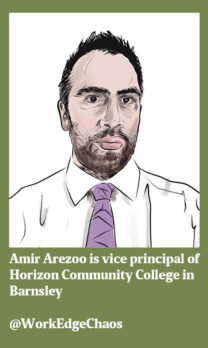Core and hinterland
@adamboxer1
Given the refocusing on the EBacc subjects of science, languages, history and geography, teachers understand that students must be grounded in the broad knowledge base that these subjects hold. But what knowledge actually matters in school? As a maths teacher, is it enough for me to teach students the Pythagorean theorem detached from the context in which it was born?
Adam Boxer takes as his example the Haber process – which artificially synthesises ammonia – from the GCSE chemistry syllabus. He describes the chemical process as “core” knowledge, but describes the dramatic socioeconomic context of early 20th-century Germany as a useful “hinterland” to make the core knowledge more memorable.
Paul Bambrick-Santoyo, the US educationist, would call Boxer’s “core” knowledge the “necessary but insufficient” knowledge that we can assess to see if students are learning what we teach. As Boxer indicates here, it is difficult to distinguish between the core and the hinterland. I would argue that a clinical distinction risks losing the heart of a subject, leaving students purely as retainers of facts, rather than students of a discipline.
Upgrade vs the perils of cognitive strain
@musicatmonkton
Expertise in a field is more than merely knowing “stuff”: I can tell you a worrying amount about the early Holy Roman Empire. Am I an expert in the roots of the German nation? Of course not. Neither am I an expert on reading or playing music (I often demonstrate the fine motor coordination of a toddler). Hence some
of the terminology in this was a little beyond me.
The underlying theme, however, struck a chord: the process of becoming expert comes through recognising patterns, and being able to use those patterns and other themes and models as tools in their own right. As George Bevan demonstrates, seeing students make this transition is akin to witnessing them getting an upgrade – many the time I have witnessed students who battle with a concept – only to suddenly wield it with the dexterity of Picasso.
I exaggerate, but for me, Bevan’s point remains. It is not the “stuff” that creates the expert, it is the underlying schema.
Get used to not pleasing everyone
@richard_bruford
As a leader, it is the supreme ideal to please everyone. In reality, this is difficult. The differing drivers and interests of those we aim to support in realising our vision generate conflicting views by default. It is common, then, to take a utilitarian approach to leadership: here Richard Bruford succinctly lays out the consequences of this sometimes necessary take on trying to harness the best outcome in any circumstance.
It’s not (just) what teachers know, it’s who teachers know
@profbeckyallen
Is it better to know your subject well or your students well? Becky Allen demonstrates that the trade-offs between the two are more important to consider than we often realise. She reflects on the impact on relationships of prioritising subject expertise, particularly in secondary education. This in comparison with those of a primary teacher, who likely teaches a single class for most of their week, and thus knows the drives of individual students and how they contribute to the classroom dynamic.
Allen rightly wonders about the origins of the current model of a sudden shift from one generalist teacher to mass subject specialisation at the age of 11. Whether we have capacity to introduce (or, in the case of the middle school, re-introduce), a more graduated approach to the transition is a question that I would be interested to hear answers to.
Winning teams
@shaun_allison
This reminded me of the “Inches” speech by Al Pacino in the (admittedly questionable) film Any Given Sunday, but it’s a good post. Centred on the work of Humphrey Walters and his recent Durrington talk, Shaun Allison summarises his 12 key messages about leadership. The statement “Do 100 things 1 per cent better” particularly resonated. “Rather than trying to make big changes, focus on doing the basics that little bit better.”













Your thoughts